Dental emergencies can occur unexpectedly and often cause significant distress. Knowing how to handle a dental emergency effectively can reduce stress and prevent further damage. Quick and appropriate action is crucial in minimizing pain and ensuring the best possible outcome.
Understanding Different Types of Dental Emergencies
Dental emergencies vary in severity and type. Common emergencies include severe toothaches, knocked-out or broken teeth, and bleeding. Each situation requires a specific response tailored to the type of injury or issue. Recognizing the type of dental emergency is the first step in determining the correct course of action. Understanding the nature of the problem helps in communicating effectively with your dentist, which can expedite treatment and improve outcomes.
Steps for Addressing Severe Toothaches
Severe toothaches can be debilitating and often signal an underlying problem. Begin by rinsing your mouth with warm water. This helps to clear debris and can provide some relief. Use dental floss to gently remove any trapped food particles that may be causing irritation. Avoid placing aspirin or any other painkiller directly on the tooth or gums, as this can cause tissue damage. Over-the-counter pain relief can help manage pain temporarily. However, if pain persists, contact a dentist immediately. A professional evaluation is necessary to diagnose the cause of the pain and to determine the appropriate treatment. Delaying treatment can lead to more serious complications.
Handling a Chipped, Broken, or Knocked-Out Tooth
Chipped, broken, and knocked-out teeth require prompt attention to prevent further damage and to preserve the tooth. If possible, save any broken pieces of the tooth and rinse your mouth with warm water to clean the area. Apply a cold compress to the outside of your mouth or cheek to reduce swelling and alleviate pain. Contact your dentist as soon as possible and describe the extent of the damage clearly. This information helps the dentist prepare for treatment and may influence the urgency of the appointment. In the meantime, avoid chewing on the side of the mouth with the damaged tooth to prevent additional harm.
Dealing with Soft Tissue Injuries
Soft tissue injuries, such as cuts or lacerations to the tongue, cheeks, or gums, can occur during an accident or fall. Rinse your mouth with a mild salt-water solution to clean the area and reduce the risk of infection. Apply pressure using gauze or a clean cloth to stop bleeding. If bleeding persists after 10-15 minutes, seek emergency care. Soft tissue injuries may require stitches or other medical interventions. Professional evaluation ensures proper treatment and healing. In the meantime, avoid consuming hot or spicy foods that may irritate the injury.
Managing a Lost Filling or Crown
A lost filling or crown can cause discomfort and may expose the tooth to further damage. Avoid chewing on the affected side to prevent additional harm. Over-the-counter dental cement can temporarily replace the crown, providing a temporary fix until you can see your dentist. Do not use glue or any non-dental adhesive, as these can cause more harm than good. Schedule an appointment with your dentist promptly to address the issue. Your dentist will provide a permanent solution, such as replacing the filling or crown, ensuring the tooth remains protected and functional.
When to Seek Professional Help
Not all dental issues require emergency care, but persistent pain or swelling signals a problem that needs attention. Immediate professional help is necessary in these cases to prevent complications. Delaying treatment can lead to more serious issues, such as infections or permanent damage. Always err on the side of caution and consult with a dental professional if you are unsure about the severity of your situation. Early intervention often leads to better outcomes and less invasive treatments.
In a dental emergency, contact Peak Dental for immediate assistance. Dr. Aaron Barborka and his team provide prompt and compassionate care. They handle emergencies with expertise, ensuring you receive the best possible treatment. Their commitment to patient care and emergency response makes them a reliable choice for handling dental emergencies. Contact their office today to schedule an emergency consultation and learn more about your treatment options.

